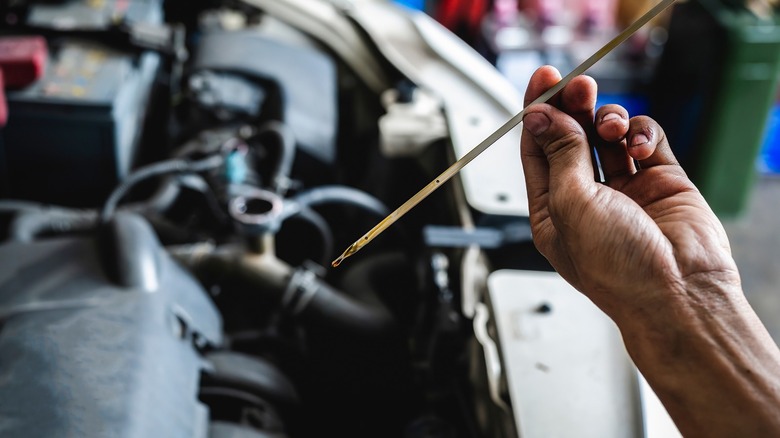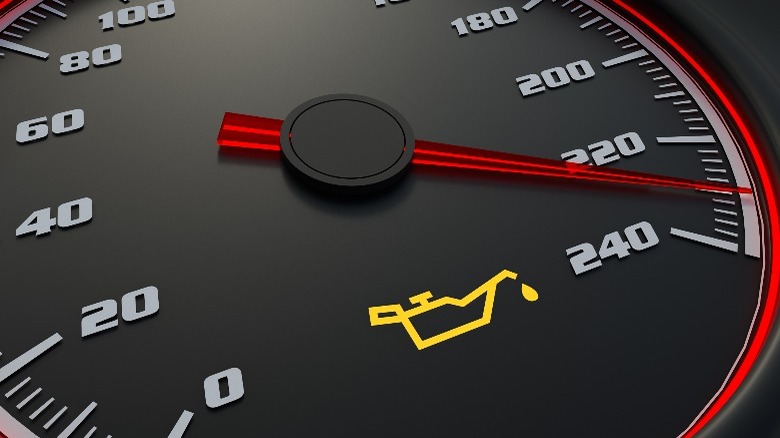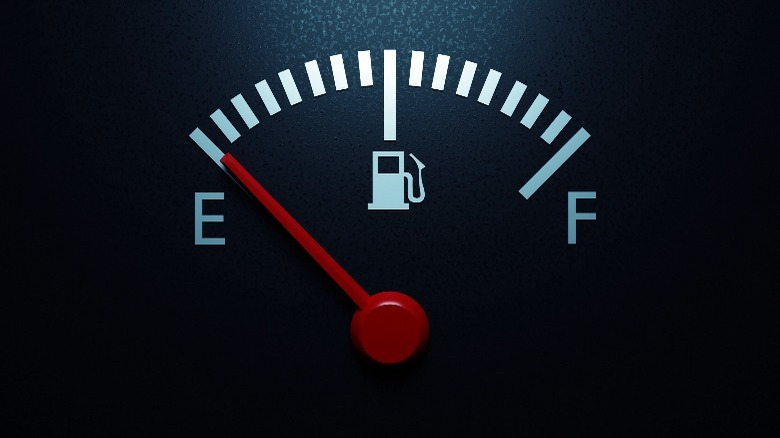5 Signs That Your Car's Engine Oil Is Running Low
Motor oil is the lifeblood of your car's engine. Not only does it provide lubrication for all of your engine's internal moving parts — of which there are massive amounts — but it also works like a heat sink, absorbing excess warmth from the engine and carrying it away from sensitive components. Due to its critical applications, it's vital that you replace and maintain your motor oil regularly. For most drivers, that means replacing the oil every 3,000 to 7,500 miles. Changing your engine oil is one of the easiest and most fundamental maintenance jobs you can perform for your vehicle, and you should never skip an oil change.
But replacing your car's oil isn't the only thing you need to do. It's also important to check your oil regularly to ensure it's in good condition and that the level is within a healthy range. The easiest way to check your oil is by using your engine's oil dipstick. However, there are other signs that your oil level may be dropping too low. It's vital that you monitor your vehicle's performance and check the oil using the dipstick routinely. Doing both will help you stay ahead of any issues and allow you to address potential problems before they spiral into full-blown catastrophes. But what exactly are the signs that your engine oil is running low? From dashboard warning lights to strange smells and sounds, here are five signs that you need to top off your engine oil.
Warning lights appear on your dash
When your car has a problem, one of the first signs is often a dashboard warning light. Many people are familiar with the infamous check engine light (CEL). However, some people may not be aware that their cars have numerous warning lights, each designed to indicate issues with various vehicle systems. While your CEL may appear if your oil level drops too low, it's not the only light you may see. More commonly, your oil pressure warning light will pop up on the dash if the level falls below a certain threshold.
The oil pressure light is connected to an oil pressure sensor, which is usually installed on the engine block. Most oil pressure sensors monitor engine oil pressure using a diaphragm and a spring switch. When the engine oil pressure is within an appropriate range, the sensor's diaphragm is compressed, preventing the switch from activating. However, if the pressure drops too low, there won't be enough force to hold the spring switch in place. When that occurs, the switch will activate and trigger the warning light on your dash, notifying you that your oil level is dangerously low and giving you time to address the issue before it causes deeper problems.
Your engine is overheating
We mentioned above that motor oil functions as both a lubricant and a heat sink. Both of those applications are critical to keeping your engine healthy and preventing overheating. We explained that, as a heat sink, motor oil absorbs excess warmth and carries it away from sensitive engine components. But even as a lubricant, motor oil helps prevent the engine from becoming too hot. Without the proper lubrication, all of those internal moving parts will create massive amounts of friction, producing large amounts of heat. While it's normal for your engine to get extremely hot during everyday use, it can only withstand so much heat. If the temperature levels rise too high, you'll likely experience various issues, ranging from minor overheating problems to a completely seized engine.
Some of the signs that your engine is overheating include smoke from the engine bay, strange thudding noises, and reduced engine performance. While various problems can cause your engine to overheat, lacking motor oil is one of the most common culprits. Considering the damage heat can do to your engine and the high costs of engine repair, if you experience any signs of an overheating motor, you should stop driving immediately. Pull over when it's safe to do so and check your oil and coolant reservoir. If your coolant or oil levels are too low, top them off and see if that fixes the problem. If not, you'll need to contact a professional mechanic for an inspection.
You can smell burnt oil
A burning oil smell is typically indicative of an oil leak. The smell occurs when oil drips out of the engine and falls onto an extremely hot component, like the exhaust system. If you can smell burning oil while driving your vehicle or while it's idling, there's a good chance you've got a leak somewhere. If you do have a leak, your oil level will most likely drop too low, potentially causing performance issues, internal engine damage, and overheating.
If your car has a burning oil smell, the smartest thing to do is pull over, wait for your engine to cool down sufficiently, and then check your oil level. If the dipstick shows that your oil level is low, you'll probably need to contact a mechanic immediately. If the level is within the appropriate range, you may still have a leak, but it could be less severe or at an earlier stage. Alternatively, there may simply be some leftover oil residue on the engine after a recent oil change. Regardless, a burning oil smell is not normal, and you should never ignore it. A lot of things can cause your engine to leak oil, and if you don't address the issue in a timely manner, you may develop far worse and more expensive damage in the long run.
Your car's performance drops
If your vehicle's engine isn't receiving the correct amount of oil, it won't be able to function properly. For one, without the proper lubrication, your engine will have to work much harder to turn the wheels. That extra work comes at the expense of things like engine performance and fuel efficiency. Two, your engine is going to become much hotter than usual if there isn't enough oil to prevent friction and carry excess heat away from sensitive components.
When those things occur, you'll likely experience a range of problems. One of the first things you may notice is that your car struggles to accelerate or climb hills. You'll also probably see a drastic reduction in your gas mileage. Those things are bad enough on their own. But it's important to recognize these symptoms when they occur because you'll likely experience performance issues before the severe problems begin, like extreme overheating or broken internal parts. There are many issues that can cause your engine's performance to plummet and your fuel efficiency to drop, but none of them are good for your vehicle. If you experience performance issues while driving your car, the smartest move is to contact a professional mechanic immediately.
Your engine is making strange sounds
We've established that motor oil is essential for lubricating your engine's internal moving parts. So, it makes sense that if your engine doesn't get the proper amount of oil, those moving parts are going to become a lot more intimate. Instead of gently sliding past one another, internal components may begin grinding, clunking, and thudding into each other as the engine moves. Not only will that cause a lot of damage, resulting in things like metal shavings and even broken parts, but it will also most likely cause a lot of unpleasant noise.
Your car can make many strange sounds, which can indicate various problems. If your engine is extremely low on oil, you may hear noises like thudding, grinding, knocking, or clunking coming from the engine bay. Hearing these noises is not a good sign. It most likely means that your engine has already been without oil for a significant period of time. The damage is probably already done, and you'll most likely need extensive repairs. Engine noises don't always indicate low oil levels, though. Various issues can cause this problem, including bad spark plugs or worn-out piston rod bearings. If you experience this issue, you should contact a professional mechanic immediately. While your engine is probably already damaged, contacting a repair technician as soon as possible can help prevent even more severe problems and costlier repairs.





